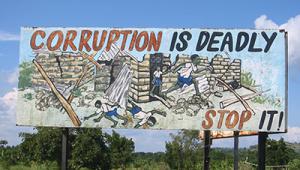Web_Yangon_shutterstock_307750499.jpg

Yangon, Myanmar at night
The bank’s guidance was issued in a series of policy notes to help the country towards achieving inclusive growth as it emerges from decades of military and quasi-military rule into a period led by its first democratically elected government.
Ulrich Zachau, World Bank country director for Southeast Asia, said Myanmar was faced with a “great opportunity” to turn continued strong economic growth into better lives for its people.
Zachau said three policy directions will be key: public sector accountability; universal access to basic education, health and energy services; and further opening and diversification of the economy.
Currently, other than the budget, there is a lack of publicly available information on government spending priorities in Myanmar. Neither the budget or draft budget are submitted to parliament and audited financial statements of the government go unpublished.
At the same time, tax efforts are hampered by administration systems that are susceptible to corruption, fragmented institutional arrangements and a multitude of fees, charges and levies collected by different government agencies.
While reforms in public financial management and towards greater transparency have already begun to reap results, the bank suggested a number of measures to build on this progress.
A fair and transparent tax system, transparent public expenditures, empowered local authorities, public engagement in policy reform and minimum standards for public services should all be gradually introduced to increase accountability, the bank said.
It noted that Myanmar’s government is already small relative to the country’s large service delivery needs, and there is no scope to reduce it further. This means that, if it is to expand social services, Myanmar will have to become more efficient and effective.
As well as pushing the country to “spend better”, the bank suggested it make room in the budget for social services spending, reduce a multitude of parallel financing channels and arrangements and harmonise the financing and delivery of social services in conflict-affected areas in order to close the service gap and tackle geographical disparities in access.
The bank also recommended measures to increase access to sustainable energy, build an open, modern and inclusive financial system and foster a competitive and dynamic business environment.
Abdoulaye Seck, World Bank country director in Myanmar, said the country faces a “long road ahead”, but nevertheless has the potential to follow a similar path of inclusive growth seen elsewhere in Asian countries that have enjoyed long periods of rapid income growth.













